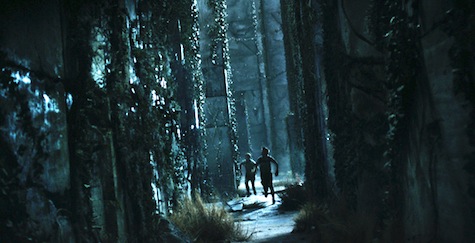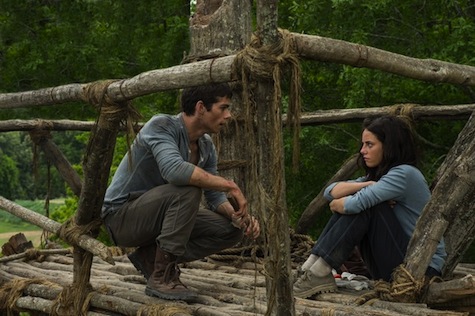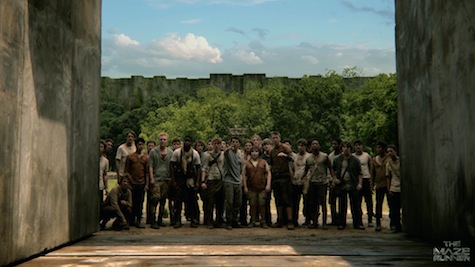What does The Maze Runner want to be? At first glance it seems like a dystopian update of Lord of the Flies, with its society of adolescent males fending for themselves in a (fabricated) wilderness. But it lacks that book’s balls. Is the titular maze, which the boys must navigate to find their way out, supposed to be an elevated response to The Hunger Games’ arena? Because Catching Fire raised those stakes with their tick-tock-it’s-a-clock arena. Is this a futuristic tale of torturing training scrappy little smarties because they’re our future, à la Divergent? Because let me tell you now, you won’t be invested enough in this film to care what kind of future the stars are supposed to be saving.
This dystopian world (based on James Dashner’s book of the same name) is too jumbled to retain any sense of structure—ironic, for a story about a maze penning in the protagonists. Many narrative elements from Dashner’s series are lost in translation, making for a movie that seems to suffer from an identity crisis.
Don’t get me wrong—it’s a very cool idea. We start the movie sharing protagonist Thomas’ (Teen Wolf’s Dylan O’Brien) POV as he wakes up in the Box, which deposits him in the Glade with twenty-odd other adolescent boys who have been dumped there with nothing more than their wits (and their names, once they remember them a day or two later). He’s the latest “greenie” to enter the Glade; one comes each month, along with supplies from a mysterious source.
For the next few days, Thomas learns the rules of the Glade: Each boy does his part, there’s no lying or infighting, and you never go into the Maze. Well, except for Runners. Those idolized members of this ad hoc society are allowed to dash around the Maze to their hearts’ content.
What Maze? Oh, just that gigantic, cement prison surrounding the Glade on all sides and sitting invitingly open all day. Whereas most labyrinthine narratives feature the middle of the maze as the reward, instead we start inside and must work our way out. Except that it’s impossible to do so, since the Maze closes itself down every night and rearranges its insides. Plus, there are the nocturnal, biomechanical Grievers, which want to sting you and eat you.

Of course, nothing in a dystopian story is impossible. Especially once the messianic figure appears, here in the form of dear, perpetually-slack-jawed Thomas. Who, no surprise, becomes a Runner less than a day after recovering his own name, because a dystopian hero must always do everything better than his or her peers.
Here’s where things get inconsistent. For nearly the first hour, so much emphasis is put on the Glade as the boys’ home, for the rules and bonds and roots they have put down in their varying time there. In the world of the movie, about three days have passed.
Then Thomas disrupts everything by running into the Maze. We’ve simultaneously spent too much time in the Glade and too little time. How are we as audience members supposed to revere the Glade as the rest of the boys do, when Thomas doesn’t? Not even the arrival of the sole girl, Teresa (Kaya Scodelario)—who the Box deposits with the ominous note “she’s the last one ever”—is enough to really rattle the group.
Around this point, when Gladers start getting picked off remorselessly (and you remember that there’s really only about six characters you actually care about), Thomas and hotheaded elder Gally get into a shouting match, with the closest thing to the film’s antagonist shouting, “I’ve been here three years, you’ve been here three days!” At this point, our theater burst into laughter. Why wouldn’t we—Gally’s point perfectly encapsulates how formulaic this movie is, and the extent to which we truly cannot care, because there was no emotional underpinning to start with.

Part of what’s frustrating is that these are all talented actors given shoddy material. Dylan O’Brien is a Tumblr darling, yet he spends this movie caught between a determined smolder and his mouth hanging open like an idiot. Thomas Brodie-Sangster was one of the best parts of Love Actually, yet his Newt is little more than a pint-sized version of the brooding English mentor figure. And while Will Poulter got plenty of acclaim for Son of Rambow, as Gally he’s distressingly one-note.
There’s an interlude where we briefly explore Thomas and Theresa’s connection outside of the Glade. Without giving too much away, it seems like it could be a ripe commentary on the quintessential “prisoners vs. prison guards” experiment. Then the plot veers away from it as if it never happened.
Even when Patricia Clarkson’s ominous leader gives us the dystopian explanation, which is the only surprise we’re waiting around for, it’s rushed and unsatisfying. To give you an idea: This is all overseen by an organization called WCKD: World Catastrophe Killzone Department. More like WTF, amirite?
Like its titular Runners, darting in and out of the Maze looking for routes out, The Maze Runner tests different genres and influences before dropping them, trying to find one that fits. Fans of the book will likely enjoy seeing that world come to life, but unlike The Hunger Games, the movie doesn’t have the capacity to capture the attention of anyone but its core book audience.
Photos: Twentieth Century Fox Film Corporation
Natalie Zutter writes plays about superheroes and sex robots, articles about celebrity conspiracy theories, and Tumblr rants about fandom. You can find her commenting on pop culture and giggling over Internet memes on Twitter.










